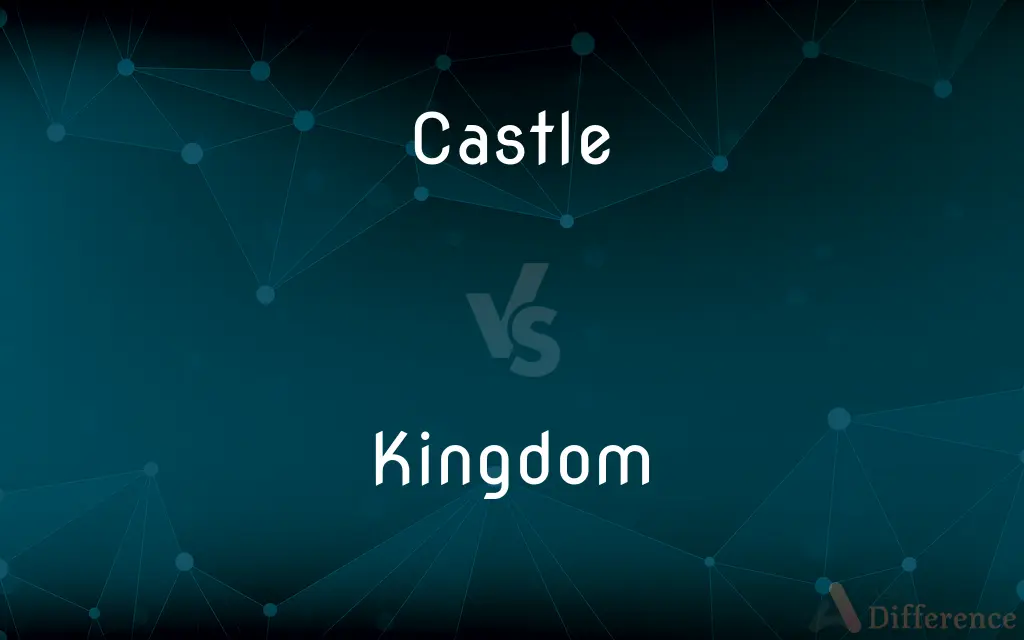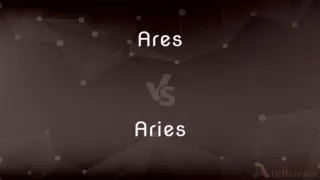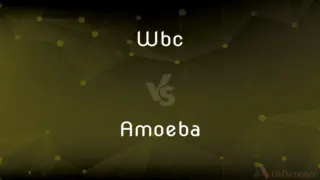Castle vs. Kingdom — What's the Difference?
By Tayyaba Rehman & Maham Liaqat — Updated on April 1, 2024
A castle is a fortified structure, often a residence of nobility, whereas a kingdom is a vast territory ruled by a monarch.

Difference Between Castle and Kingdom
Table of Contents
ADVERTISEMENT
Key Differences
A castle is a large, fortified residence or complex of buildings, typically built during the medieval period for defense against attacks. Castles were often the homes of monarchs or nobles and served as centers of administration, military operations, and symbols of power. On the other hand, a kingdom encompasses a much broader concept, referring to a territory or realm under the rule of a king or queen. Kingdoms consist of not just one building or location, but a wide expanse of land that includes many towns, cities, and often multiple castles.
While castles are primarily architectural and military structures designed with high walls, towers, and moats for protection, kingdoms are political entities defined by geographical boundaries, governance systems, and populations. The purpose of a castle is to provide safety and control over a specific area, often serving as a noble residence or a military stronghold. In contrast, a kingdom's purpose is to establish a governed territory under a unified rule, encompassing economic, social, and political dimensions.
Castles played a key role in the feudal system, acting as the administrative and military headquarters within a kingdom. They were strategic assets in warfare and power projection. Kingdoms, however, were the overarching units of sovereignty, with their rulers' authority extending over all lands, peoples, and institutions within their borders, including multiple castles.
In terms of governance, a castle might have been ruled by a lord or noble who owed allegiance to a higher monarch. This lord managed the castle's immediate lands and affairs. Meanwhile, a kingdom was governed by a monarch, who had ultimate control over its laws, military, and resources, including all castles within the kingdom. The monarch's decisions affected the entire kingdom, from its foreign relations to internal policies.
Castles are seen as symbols of medieval heritage, representing the architectural and military ingenuity of the past. They are often romanticized in literature and media. Kingdoms, while also steeped in historical and cultural significance, represent the broader societal, cultural, and political organization of a period or region, influencing everything from language and culture to economics and law.
ADVERTISEMENT
Comparison Chart
Definition
A fortified structure or complex, typically medieval, serving as a noble residence and military stronghold.
A territory or realm ruled by a monarch, encompassing a broad area including many castles, cities, and towns.
Purpose
Defense, residence of nobility, symbol of power.
Governance of a territory, establishment of law and order, cultural and economic development.
Components
High walls, towers, moats, living quarters.
Cities, towns, castles, natural resources, population.
Historical Role
Part of the feudal system, serving as administrative and military centers within a kingdom.
Units of sovereignty, with overarching control over lands, people, and institutions, including castles.
Governance
Ruled by lords or nobles, managing immediate lands and affairs.
Governed by a monarch with ultimate authority over laws, military, and resources.
Compare with Definitions
Castle
Medieval Heritage.
The ancient castle is a significant part of the region's medieval heritage.
Kingdom
Ruled by a Monarch.
The kingdom was united under the rule of a just queen.
Castle
Fortified Structure.
The castle's towering walls protected it from invaders.
Kingdom
Cultural and Economic Development.
The kingdom flourished, becoming a center of trade and culture.
Castle
Residence of Nobility.
The noble family lived in a grand castle overlooking the village.
Kingdom
Historical and Cultural Significance.
The kingdom's history is filled with tales of bravery, betrayal, and romance.
Castle
Military Stronghold.
The castle served as a strategic military base during the war.
Kingdom
Territorial Realm.
The kingdom stretched across vast mountains and rivers.
Castle
Symbol of Power.
The expansive castle symbolized the lord's dominance over the region.
Kingdom
Political Entity.
The kingdom maintained its sovereignty despite neighboring conflicts.
Castle
A castle is a type of fortified structure built during the Middle Ages predominantly by the nobility or royalty and by military orders. Scholars debate the scope of the word castle, but usually consider it to be the private fortified residence of a lord or noble.
Kingdom
A country, state, or territory ruled by a king or queen
The Kingdom of the Netherlands
Castle
A large fortified building or group of buildings with thick walls, usually dominating the surrounding country.
Kingdom
The spiritual reign or authority of God.
Castle
A fortified stronghold converted to residential use.
Kingdom
Each of the three traditional divisions (animal, vegetable, and mineral) in which natural objects have conventionally been classified.
Castle
A large ornate building similar to or resembling a fortified stronghold.
Kingdom
A political or territorial unit ruled by a sovereign.
Castle
A place of privacy, security, or refuge.
Kingdom
The eternal spiritual sovereignty of God or Christ.
Castle
(Games) See rook2.
Kingdom
The realm of this sovereignty.
Castle
To move the king in chess from its own square two empty squares to one side and then, in the same move, bring the rook from that side to the square immediately past the new position of the king.
Kingdom
A realm or sphere in which one thing is dominant
The kingdom of the imagination.
Castle
To place in or as if in a castle.
Kingdom
In the Linnean taxonomic system, the highest taxonomic category into which organisms are grouped, based on fundamental similarities and common ancestry. One widely used taxonomic system designates five or six such groups
Animals, plants, fungi, protists, and prokaryotes (often divided into bacteria and archaea). Other systems divide organisms into domains (eukaryotes, bacteria, and archaea) that replace or rank above kingdoms.
Castle
(Games) To move (the king in chess) by castling.
Kingdom
One of the three main divisions (animal, vegetable, and mineral) into which natural organisms and objects have traditionally been classified.
Castle
A large residential building or compound that is fortified and contains many defences; in previous ages often inhabited by a nobleman or king. Also, a house or mansion with some of the architectural features of medieval castles.
Kingdom
A realm having a king and/or queen as its actual or nominal sovereign.
Castle
(chess) An instance of castling.
Kingdom
A realm, region, or conceptual space where something is dominant.
The kingdom of thought
The kingdom of the dead
Castle
A rook; a chess piece shaped like a castle tower.
Kingdom
(taxonomy) A rank in the classification of organisms, below domain and above phylum; a taxon at that rank (e.g. the plant kingdom, the animal kingdom).
Castle
(shogi) A defense structure in shogi formed by defensive pieces surrounding the king.
Kingdom
The rank, quality, state, or attributes of a king; royal authority; sovereign power; rule; dominion; monarchy.
Thy kingdom is an everlasting kingdom.
When Jehoram was risen up to the kingdom of his father, he strengthened himself.
Castle
(obsolete) A close helmet.
Kingdom
The territory or country subject to a king or queen; the dominion of a monarch; the sphere in which one is king or has control.
Unto the kingdom of perpetual night.
You're welcome,Most learned reverend sir, into our kingdom.
Castle
(dated) Any strong, imposing, and stately palace or mansion.
Kingdom
An extensive scientific division distinguished by leading or ruling characteristics; a principal division; a department; as, the mineral kingdom. In modern biology, the division of life into five kingdoms is widely used for classification.
Castle
(dated) A small tower, as on a ship, or an elephant's back.
Kingdom
A domain in which something is dominant;
The untroubled kingdom of reason
A land of make-believe
The rise of the realm of cotton in the south
Castle
The wicket.
Kingdom
A country with a king as head of state
Castle
(transitive) To house or keep in a castle.
Kingdom
The domain ruled by a king or queen
Castle
To protect or separate in a similar way.
Kingdom
A monarchy with a king or queen as head of state
Castle
(obsolete) To make into a castle: to build in the form of a castle or add (real or imitation) battlements to an existing building.
Kingdom
One of seven biological categories: Monera or Protoctista or Plantae or Fungi or Animalia
Castle
To move the king 2 squares right or left and, in the same turn, the nearest rook to the far side of the king. The move now has special rules: the king cannot be in, go through, or end in check; the squares between the king and rook must be vacant; and neither piece may have been moved before castling.
Kingdom
A basic group of natural objects
Castle
To create a similar defensive position in Japanese chess through several moves.
Castle
(cricket) To bowl a batsman with a full-length ball or yorker such that the stumps are knocked over.
Castle
A fortified residence, especially that of a prince or nobleman; a fortress.
The house of every one is to him castle and fortress, as well for his defense againts injury and violence, as for his repose.
Our castle's strengthWill laugh a siege to scorn.
Castle
Any strong, imposing, and stately mansion.
Castle
A small tower, as on a ship, or an elephant's back.
Castle
A piece, made to represent a castle, used in the game of chess; a rook.
Castle
To move the castle to the square next to king, and then the king around the castle to the square next beyond it, for the purpose of covering the king.
Castle
A large and stately mansion
Castle
A large building formerly occupied by a ruler and fortified against attack
Castle
(chess) the piece that can move any number of unoccupied squares in a direction parallel to the sides of the chessboard
Castle
Interchanging the positions of the king and a rook
Castle
Move the king two squares toward a rook and in the same move the rook to the square next past the king
Common Curiosities
How does a kingdom differ from an empire?
A kingdom is ruled by a king or queen and often denotes a single nation, whereas an empire might encompass multiple kingdoms or territories under a single ruler, often an emperor or empress.
What was the role of castles in a kingdom's defense?
Castles served as fortified sites for defense against invaders, control points over land, and safe havens for the nobility during sieges.
What happens to castles and kingdoms in modern times?
Many castles have become tourist attractions or historical sites, while the concept of kingdoms persists in some regions, with monarchs often serving symbolic roles in constitutional monarchies.
What defines a castle?
A castle is defined by its fortification, purpose as a residence and military stronghold, and historical role in medieval society.
How is a kingdom governed?
A kingdom is governed by a monarch who has the ultimate authority over its laws, military, and resources, overseeing its political, economic, and social systems.
Are all castles built during the medieval period?
While most iconic castles were built during the medieval period, fortifications resembling castles have been constructed in other eras for similar defensive purposes.
How did castles evolve over time?
Over centuries, castles evolved from simple earth and timber constructions to complex stone fortresses with sophisticated defense mechanisms.
Can a kingdom exist without castles?
Theoretically, a kingdom can exist without castles, especially in non-medieval contexts, but historically, castles were integral to the defense and administration of kingdoms.
Can someone own a castle today?
Yes, private ownership of castles is possible, though it often comes with significant maintenance costs and responsibilities.
How do modern monarchies compare to historical kingdoms?
Modern monarchies often function within constitutional frameworks, with monarchs serving ceremonial roles, unlike the absolute rule common in historical kingdoms.
What significance do kingdoms hold in history?
Kingdoms are pivotal in history for their roles in consolidating territories, cultures, and governance structures, shaping the development of civilizations.
Why are castles considered symbols of medieval heritage?
Castles are iconic of the medieval period, representing feudal societies, architectural ingenuity, and the era's military and social structures.
What influences did kingdoms have on modern borders?
Historical kingdoms have significantly influenced the cultural and political landscapes of regions, including modern state borders and identities.
What role do castles play in literature and media?
Castles are frequently featured in literature and media as settings for drama, fantasy, and historical narratives, symbolizing power, mystery, or heritage.
How were castles maintained and staffed?
Castles were maintained by a large staff including soldiers, servants, and craftsmen, funded by the wealth of the lord or noble.
Share Your Discovery

Previous Comparison
Ares vs. Aries
Next Comparison
WBC vs. AmoebaAuthor Spotlight
Written by
Tayyaba RehmanTayyaba Rehman is a distinguished writer, currently serving as a primary contributor to askdifference.com. As a researcher in semantics and etymology, Tayyaba's passion for the complexity of languages and their distinctions has found a perfect home on the platform. Tayyaba delves into the intricacies of language, distinguishing between commonly confused words and phrases, thereby providing clarity for readers worldwide.
Co-written by
Maham Liaqat















































